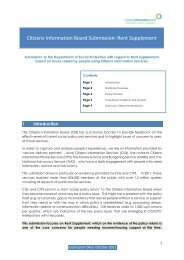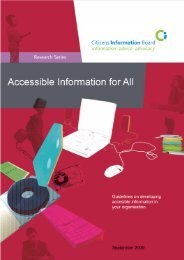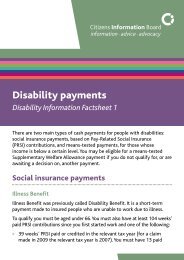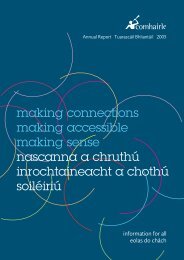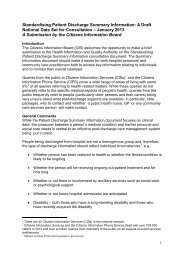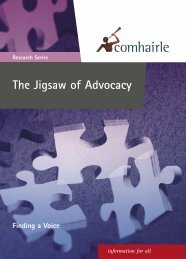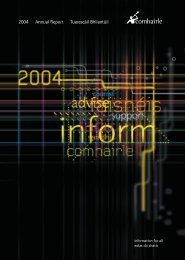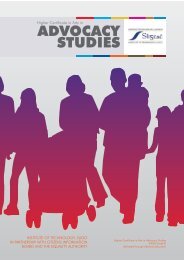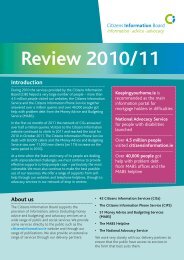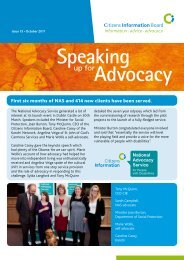Review of Sign Language Interpretation Services and Service ...
Review of Sign Language Interpretation Services and Service ...
Review of Sign Language Interpretation Services and Service ...
- No tags were found...
You also want an ePaper? Increase the reach of your titles
YUMPU automatically turns print PDFs into web optimized ePapers that Google loves.
the UK's Disability Discrimination Acts <strong>of</strong> 1995 <strong>and</strong> 2005 (DDA), which outlawdiscrimination on the grounds <strong>of</strong> disability in access to goods <strong>and</strong> services,employment, buying or renting l<strong>and</strong> <strong>and</strong> property. The associated SpecialEducational Needs <strong>and</strong> Disability Act, 2001 (SENDA) deals with discriminationin education.Those with responsibilities under this legislation are required to make 'reasonableadjustments' so that disabled people (as defined by the DDA), are able to accesstheir services. Similar obligations apply to employers/potential employers inrecruitment <strong>and</strong> employment <strong>of</strong> staff.For Deaf people one <strong>of</strong> the key effects <strong>of</strong> these provisions is to provide a qualifiedright to SLI services for specific purposes. The provision <strong>of</strong> a sign languageinterpreter may constitute an example <strong>of</strong> a reasonable adjustment under the DDAbut the act does not specify in exactly what circumstances this would be the case.The DDA has done much to raise general awareness about the needs <strong>of</strong> Deaf <strong>and</strong>people with disabilities <strong>and</strong> has contributed to the development <strong>of</strong> more positiveattitudes. However for Deaf sign language users, their access to the rightsafforded by the law <strong>and</strong> the means whereby service providers respond is basedon a definition <strong>of</strong> them as disabled, which many regard as inappropriate. Thecapacity for sign language users to access these rights <strong>and</strong> for service providers<strong>and</strong> employers to make 'reasonable adjustment' is critically limited by the shortage<strong>of</strong> interpreters <strong>and</strong> the need for greater awareness on the part <strong>of</strong> Deaf people <strong>and</strong>service providers about their respective rights <strong>and</strong> responsibilities under the law.5.2.3 Combinations <strong>of</strong> the linguistic <strong>and</strong> disability approachMost <strong>of</strong> the countries studied in this review have norms <strong>and</strong> entitlements to SLIservices which reflect both <strong>of</strong> these approaches.Scotl<strong>and</strong> is a country that is in the middle <strong>of</strong> an attitudinal change towards Deafpeople. British <strong>Sign</strong> <strong>Language</strong> (BSL) was <strong>of</strong>ficially recognised in March 2003.Since then, the Scottish Executive has passed responsibility for linguistic access inBSL to the Scottish Executive's Equality Unit. There is also a BSL <strong>and</strong> LinguisticAccess Working Party, which acts as an umbrella body under which the variousDeaf <strong>and</strong> Interpreting Organisations can come together. However, in spite <strong>of</strong> thischange in strategy, in reality, entitlement to interpreting services for Deaf peoplein Scotl<strong>and</strong> is through the Disability Discrimination Act (DDA).5.2.4 Prioritisation <strong>of</strong> SLI servicesWhether entitlements are defined <strong>and</strong> SLI services provided on the basis <strong>of</strong>linguistic need or disability, it is inevitable that some prioritisation has to takeplace. Government funding for SLI services reflects the statutory obligations <strong>of</strong>each country, i.e. as set out in legislation. Deaf people's entitlements in other(non-statutory) areas may be more limited. In all the countries considered in thisreview, access to justice has priority, followed by education, employment, <strong>and</strong>medical situations.For example, the Danish government requires that interpreting support beprovided for any Deaf person who needs to attend court, or to see their doctor.<strong>Review</strong> <strong>of</strong> <strong>Sign</strong> <strong>Language</strong> <strong>Interpretation</strong> <strong><strong>Service</strong>s</strong> <strong>and</strong> <strong>Service</strong> Requirements in Irel<strong>and</strong> • page 87



